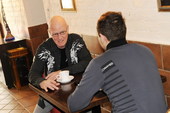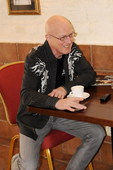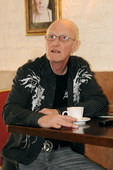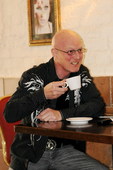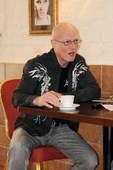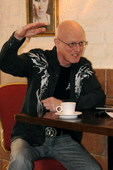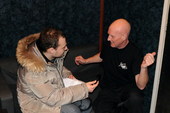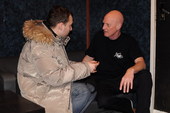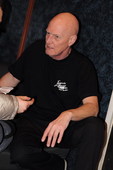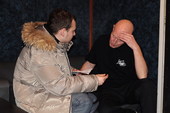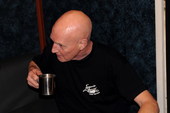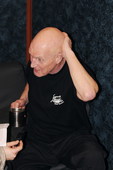Chris Slade
I Don’t Have a Favorite Style
25.09.2011
Архив интервью | Русская версияPersons like Chris Slade seem to have been everywhere and have seen everything. He spoke to Neil Peart when he had just been two weeks with Rush, he played with Tom Jones before Tom even got his world-famous stage name, and he performed with AC/DC at the infamous Monsters In Rock festival in Moscow in 1991. But if you’re think he’s a veteran on the age of retirement, that’s not quite correct. Chris is still traveling around the world with all kinds of bands, and one of such trips once again took him to Moscow, where he performed an AC/DC tribute set with a local cover band as part of the mini-festival which also featured guitarists Keri Kelli (Alice Cooper band) and Chris Holmes (ex-W.A.S.P.). On the eve of that show we hooked up with the legendary drummer to hear some of the stories he’s got to tell and to share it with our readers…
How did it happen that you were involved in that project with Keri and Chris?
Keri and I have been working in my band Steel Circle which is the circle of friends who are available to have fun playing AC/DC music, and who can get on well together and to like each other on stage and off stage. We used to live close by to each other with Keri in Orange County in California. I lived in California for seven years, so I got to know Keri through some other friends, through Robbie Crane of Ratt, bass player of this band, who did the last tour with us, not this tour. Chris Glenn, the bass player from MSG, did these last few weeks that Keri and I worked together. Keri said, ”Would you like to come to Moscow with me and Chris Holmes?” I said, “Yes, sure, absolutely”. And this how it happened.
As to Steel Circle - do you have plan to record something with that band?
Yes, if ever we get time. In fact, on the bus on this last tour Leon, the singer, and Keri and myself just did some demos. In fact, I recorded it on this phone here. (shows his mobile phone) So we have the embryo of two or three new songs that we can put together for Steel Circle.
I saw on your web site that you’re also gonna tour with band called Vonzep in Japan…
Yes. That’s a brand new band with Jimmy Sakurai, the Japanese guitarist. and two American guys: Jim Wooten (bass) and Swan Montgomery (vocals) from Led Zepagain, which is a Led Zeppelin tribute band, the biggest and best in America, actually, they are very-very good and they have been doing it for 20 years. Their idea was to do Zeppelin songs, but we have also recorded two originals along with “Dancing Days”, a Zeppelin song actually, which as I heard yesterday, and it turned out really well, better than I could have expected. A really good job by everybody, including the producer and engineer. It’s a good project and we don’t know where we will go, we’re just doing a few little gigs in Tokyo and Detroit. We have already rehearsed in California. I think I leave on Wednesday to go to Tokyo for 10 days or something like that.
Also you’ve got a very nice project called Damage Control. What is happening to this band now?
With Damage Control we did one album, which I liked. Robin Gorge (guitar) put another project together called Love Power which is coming out almost immediately, in March. Robin is living in Spain and doing his projects, Pete Way (bass) is actually playing on a Michael Shenker album, which I also did a track for just 10 days ago in Switzerland. Myself and Chris Glenn, bass player, who is the original MSG player, are on this Steel Circle tour. We did a session with Michael Voss in Switzerland, two tracks for the new Michael Schenker album. I’m looking forward to hearing that when that happens.
So, what about Damage Control?
I enjoyed doing that, and I like that name Damage Control. Who knows, we might do anther one in the future.
You started out as a drummer in the band of Tom Jones, and it looks like an amazing first experience. Did you play anywhere before?
No, I joined the Tom Jones thing when I was 17 years old. Tom is older than me, he went to school with my elder brother actually. I played in youth clubs and things like that before I joined his band. But when I joined Tom Jones he wasn’t Tom Jones, he was Tommy Scott of the Senators, the band was called Tommy Scott & The Senators. It sort of grew, it was a great learning experience for me, because I started off doing working men’s clubs in South Wales, where Tom, myself and the rest of the band were born. These clubs was packed every night with miners, steelworkers and people like that. That’s the area we grew up in, a mining and steelworking area. We progressed through that for a couple of years and then we moved to London. In London Tom became Tom Jones, and the band became Tom Jones and the Squires. We did that for a few years, Tom then started to go into cabaret instead of being a rock’n’roll band which we were. We were a rock’n’roll band, a little bit like the Beatles were before they became The Beatles, if you see what I mean. Tom start wearing bow-ties and stuff, so did I and tuxedo playing drums. Then we went to Las Vegas… I was with him for a total of seven years, from 1963 to 1970.
Why did you stop playing in Tom’s band?
The reason was that I found out the guitarist was getting three times more money I was getting. (laughs) So I said “goodbye” and left never to go back.
Are you still in touch with him?
Yes, I saw him just last year in Las Vegas. We propped up the bar until 4 a.m. (laughs) Actually it was me and him and couple of his friends.
After Tom Jones you did a record for the band Tomorrow with Olivia Newton-John on the vocals. I heard that it was a kind of soundtrack. Tell me about this experience.
I played on that soundtrack as a session man. Before I joined the band I was booked as a session man. I think it was Hugo Montenegro who did the music, I am not sure, he did “For A Fistful Of Dollars”, but I am not certain of that, I must do my research. I just auditioned along with hundreds of the drummers, the same as I did with AC/DC actually. It was a good project, it paid well, but it didn’t go for very long, six months maybe. I think I rehearsed once at that time, and that was it.
The next step in your career was Manfred Mann’s Earth Band. You stayed with them for a pretty long time. What are your memories from that period?
Oh, really good memories! It enabled me to stretch my technique, to stretch my knowledge, I also wrote some lyrics for Earth Band. We were on one tour we did, Rush opened the show, and I remember having a conversation with Neil Peart, he’d been in the band for two weeks, that’s all. We had a conversation about why shouldn’t drummers be the lyricists for the bands, and Neil has been the lyricist for Rush ever since. Also Herman Rarebell, Herman Ze German (laughs), wrote the lyrics for Scorpions. I also traveled on the road with them.
Do you currently play the Earth Band songs that you composed?
No, but I’d like to. In fact, I’m going to re-record some of the tracks of Earth Band, of AC/DC, anything I’ve been involved in, maybe Pink Floyd, because of David Gilmour. I would like to put out a CD, maybe a double CD together just for myself, using friends I know. Again a Steel Circle concept – friends who enjoy playing together.
I saw on Wikipedia that you have done a record with a band called Terra Nova. Tell me please who they were.
That was originally Earth Band, but without Manfred Mann. Manfred wanted to split up Earth Band, so Colin (Pattenden), the bass player and myself said, “Manfred, you want to retire, we’d like to continue, and we want to call it Earth Band, just Earth Band”. He agreed more than twice, and we went on the road as Earth Band with the Terra Nova band, but the record company tried to stop us. At the end of the day we went, “Let’s call it a different name”. So it became Terra Nova, which in Latin is “new earth”. It was new Earth Band. And Peter Cox, who was the singer in that band, is now singing with Manfred in Earth Band. (laughs) He’s a great singer. We gave him his first professional job.
You played in Uriah Heep, but only for one album, “Conquest” (1980). How did you get there?
(pause) I can’t remember. I knew the guys, of course, cause we toured together. How it happened, I really can’t remember. I think Lee Kerslake got ill or something else, I don’t remember the circumstances now, but they asked me to do some recording sessions at the Roadhouse Studios, and when I did those, they asked me to join the band.
Why didn’t you stay with Uriah Heep for a longer time?
Well, it was two years, which is not bad, you know. It fell apart a little bit because of management and recording problems, and people just moved on. Mick Box (guitars) and Trevor Bolder (bass) just stayed together, they are still together today, and they have a very good band in Uriah Heep today. It’s fantastic, everybody is a great musician, the drummer (Russell Gilbrook) is fantastic, I love the way he plays. It’s a great band, and everybody’s happy. (laughs)
You have done a lot of recordings with solo artists as Tom Paxton, Frankie Miller, etc. It was short periods of time, no more than one album…
They were just sessions. People didn’t say who the session players were in those days, so they sort of stand out because they put “drums – Chris Slade”. That’s all it was. It was never a project, it was just, “Come and do a three-hour session, here’s your 30 pounds, goodbye”. With Frankie it was a little more, because after that album (“Falling In Love”, 1979) I did another album, which I don’t think ever came out. I spoke to Frankie, unfortunately he’s very ill, but he can listen on the phone, and told him that I enjoyed working with him and all that personal stuff. It was great to speak to him.
Tom Paxton is a folk musician, and e.g. Gary Numan has more to do with electronics. Does it mean that you can play in any genre?
Yes, I’m very lucky that my techniques allow me to be able to adapt to almost any style of playing, from jazz right through to death metal, which I’ve done once… (laughs)
You’ve done death metal?
Well, there’s a really heavy band in Los Angeles called Miwa, she is a Japanese lady, who (growls) sings very much like this. She’s a tiny little Japanese lady, and (growls) she sings like this.
(laughs) I’d like to check her out!
If you go to my website ChrisSlade.com I think there’s a link on there for Miwa. And we’re good friends, too.
But I think you still have some favorite music style. What is it?
No, I don’t have a favorite style. To me, they’re all adaptable. If you listen to, say, John Bonham playing with Led Zeppelin, I aspire to that sort of playing, whereas if you hit a tambourine, it’s good, or if you smash away with double bass drums kicking, that’s good too. To me it’s whatever the passage of music needs.
In the mid-80s you played in The Firm with Jimmy Page and Paul Rogers. Why did The Firm release only two albums and then split up?
You know, it’s difficult. With Uriah Heep I did one album, with The Firm I did two albums, with Manfred Mann’s Earth Band I did seven or eight albums. You never know, you can never tell how long a project is going to be. I was very pleased we did two years and not one year with The Firm. There is still talk that The Firm might get back together. I keep in touch with Paul Rodgers all the time. A few times a year we meet up, I saw him last week with Bad Company, and another good friend is Mick Ralphs, the guitarist of Bad Company. We keep in touch whenever we can.
And what about Jimmy Page? Are you in touch with him, too?
No, I haven’t been in touch with him for a number of years. I’ve seen him a few times, but we don’t phone each other or anything like that.
Of course I would like to ask you about AC/DC. Officially you quit the band because of the return of Phil Ruud. Was it indeed so, or was there a conflict?
The funny thing with that was that on that album where Phil joined on (“Ballbreaker”, 1995), he’s playing my drum parts! (laughs) Funny enough, I visited Cliff (Williams, bass) and Brian (Johnson, vocals) while they were recording, I was in their apartment in London, and upstairs I could hear Phil learning my drum parts. (cracks) He was playing my demos, that’s so funny! I copied his drum parts so many times.
With whom of AC/DC did you communicate more closely?
We all worked together. We all went to dinner together almost every night on the road - the five of us, the tour manager or maybe or a guest. We always communicated. They are very nice guys, all of them. I saw Cliff just a month ago in California, we were both at the NAMM show, which is the music manufacturers’ show taking place every January. We keep in touch. I saw all of them three or four times last year, including Phil. In fact, I have a picture with the three of us together – Phil, Simon Wright and myself. And I just worked with Simon Right on a John Bonham tribute night in California. Chad Smith from Red Hot Chili Peppers also played a song. I don’t know if you know about this project, it’s called “The Groove Remains The Same”. If you Google that, you’ll come up with its website. There were 20 top players, 20 top drummers along with the band. John Bonham’s widow showed up, and John Bonham’s sister, John Bonham’s daughter and Jason Bonham also showed up. They flew from England especially for this night at the Key Club on Sunset Strip.
Do John Bonham’s daughter and sister play drums?
No, they’re both singers, and they’re really good singers, too. As is Jason, he has a great voice. They really sing amazingly well. It was a great honor to play Led Zeppelin songs in front of those people. The place was packed, it was absolutely jammed. Now they’re taking it on the road, there’s about seven or eight dates in California, which I hope to be there for.
With AC/DC you performed at Moscow’s Tushino airfield back in 1991. What are your impressions from that event?
An amazing spectacle. We were all shocked that that number of people would show up, about half a million people. It was absolutely shocking in many ways. It’s a wonderful experience to play for that many people, and it’s something I will treasure and thank the Russian people for showing up. It made a great landmark in my life, and I’m sure it also did in AC/DC’s lives. So thank you Russia for that!
When people from Europe saw the DVD from that show, they were shocked, because it features scenes of fans being beaten by the police. Did you witness any of that?
No. When you’re at gigs, sometimes you do see security guards in every part of the world getting rough with somebody. You can see it off the corner of your eyes sometimes when you’re on stage, but there’s nothing you can do about it. In fact, if you walked in there, they’ll probably beat you up, too. (laughs) But it does make you think maybe you can just… I know people get rough, I was in Norway just the other day, and in a bar in Trondheim I saw somebody was drunk and he swanked at somebody and they took him down to the floor, took him outside and the police took him away. You know, it happens unfortunately. And if you get half a million people at a concert, that is going to happen. Somebody is going to have a heart attack, and somebody is going to get married. (laughs) And there was a birth as well, I believe. So we had the whole of life in front of us.
Were you scared to travel to Russia that first time?
No, I wasn’t scared. I’m trying to think whether it was really my first time, I might have been there before that. (pause) I’ve been here quite a few times after that, that I know for sure. I came with Asia to St. Petersburg, I came with Michael Schenker last year, and there was something more that I can’t remember.
In AC/DC you had a drum kit with two big drums on the sides. Was it your idea?
Yes. “Thunderstruck” was going “bum bum”, and I thought, “How the hell am I going to do this live with such a big chant?” So I said to Dick Jones, the drum tech, “I want two bass drums up here”. He was like, “What?!” I said, “I want a bass drum here and a bass drum here”. He went like, “Alright, boss!” (laughs) And that’s how it happened.
The “Live At Donington” video from 1992 was reissued on DVD recently, and it now contains a section called “Band”, where you can see some songs from that show featuring only one musician. But there is no option “Chris Slade”. Why?
I’ve never seen it, so I don’t know. I very rarely watch myself. I don’t watch “Donnington” very often. If somebody puts it on, then I will see it, but I don’t go home and watch “Donnington”. So I don’t know why, I have no idea.
And what bands do you like to watch or to listen to at home?
You know, I’m always learning something. I’m listening to Led Zeppelin right now, because I’m learning it, and I’m really enjoying it. It’s funny that I’ve been doing this tour, we’ve been to like 10 different countries, and wherever I go I’ve got Led Zeppelin playing. I’m filming the countryside and I’ve got Led Zeppelin on my cams. It’s cool to listen to that.
I heard that you were in depression after your departure from AC/DC. How did you go through it?
I wouldn’t say it was depression, that’s a very big word. I didn’t play for some time, I went to art college to learn to draw and sculpt. For three years straight, I didn’t touch a drum stick.
And nowadays do you ever draw or make a sculpture?
Yes, I have ideas in books all over the place. I’ve never been depressed in my life, very rarely have I sat down and gone, “Oh, poor me”. It doesn’t happen. Bad things have happened, but I don’t get like that, I always try to look on the positive side of things. We all get a little down sometimes, but that’s about it.
What are your best AC/DC memories?
Well, one of the big ones is playing to half a million people in Moscow. (laughs)
Among your projects there has been an interesting band called ThundHerStruck, with which you went to Afghanistan…
Ah, yes, those ladies.
What did you do in Afghanistan? Did you play at military bases?
We went to about 10 bases. Some were in the middle of nowhere up on top of the mountain in the snow. One show we played to maybe 25-30 people, they’d never had a visitor for one year. We were flying Black Hawk helicopters every day. When I was in the desert, I’d lay on top of my drums to stop the drums from blowing off into the desert when the bird took off.
How did you get on that trip?
Through ThundHerStruck, through those ladies. Their drummer couldn’t make it, and we were friends. We’re still friends, I saw them just a month ago. They’re doing a Led Zeppelin tribute as well now. (laughs) They’re great players, by the way, they’re very good.
And what about Michael Shenker Group? How did you hook up with them?
(pause) I’m trying to remember, and I can’t remember. I think I just got a phone call. It might have been through Nicholas Kostadimas, who is the tour manager of Michael Schenker, and who is also the European manager and the tour manager of Steel Circle. He lives in Switzerland.
When you played with MSG in Moscow, there were some technical problems with drums at the show. What happened?
I can’t remember. Probably a pedal broke. The trouble is when you use other people’s stuff, sometimes it’s not of the best quality or it has been used so much that it just breaks. The other day was the first time I used a rental drum kit for some time, and I went right through the bass drum head. I play very heavy, I need very good equipment, professional equipment. It’s no good if somebody’s just coming up with their son’s drumkit, it has to be professional quality, otherwise I will just break it, and that is gonna happen.
Chris Slade on the Internet: http://www.chrisslade.com
Special thanks to Pavel Potapov for arranging this interview
Interview by Sergei “BoBr” Bobrik
Photos by Alexander “SUMRAK” Nefedov
February 25, 2011
© HeadBanger.ru
